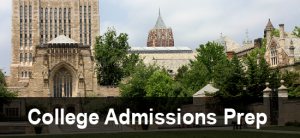Students are always asking me if summer programs can help you get into college.
MOST IMPORTANT FACT
You shouldn’t be focused on doing things just because you think they’ll look good on your college applications.
Don’t get me wrong.
I’m not saying you shouldn’t act strategically.
However, it’s easy for admissions officers to spot which students are genuinely excited about the path they’ve been creating for themselves throughout high school and those who lack true passion about their experiences.
MIT ADMISSIONS & THE STUDENT WITH A BORING APPLICATION ESSAY
Consider what MIT’s Office of Admissions has to say:
“It’s who you are that really matters. It’s how you embrace life. It’s how you treat other people. It’s passion. And yes, that stuff really does drip off the page in the best of our applications. It’s not anything I can explain—you just know when you read an application. . .”
A few years ago, a student came to me at the beginning of her senior year because her essays all seemed flat and dry.
During our consultation, she described how she’d spent so many hours grinding away at what her family thought were the “right things.”
She’d taken the most rigorous classes, earned excellent grades, aced both the SAT and ACT, participated in plenty of extracurricular activities (e.g., Science Olympiad, Model United Nations, and Mock Trial), and spent a summer at Cornell’s Summer College for high school students (which currently costs around $13,000).
Now it’s true that college admissions officers are very interested in the rigorousness of your course load, your GPA, your performance on standardized tests, and your engagement in extracurricular activities.
However, that’s not enough.
Let’s look at what MIT has to say in “There Is No Formula” because it holds true for almost all other very competitive colleges:
“Of course you need good scores and good grades to get into MIT. But most people who apply to MIT have good grades and scores. Having bad grades or scores will certainly hurt you, but I’m sorry to say that having great grades and scores doesn’t really help you – it just means that you’re competitive with most of the rest of our applicants. MIT is very self-selecting in that regard.”
My student met all the basic technical requirements, but that wasn’t enough.
Anyone reading her essays could tell that she lacked the exuberance that comes from engaging in truly meaningful experiences and projects.
What dripped off the page of her application essays was “blahness.”
HOW MY STUDENT TRANSFORMED HER COMMON APP ESSAY
However, it turns out that there was a spark of enthusiasm within her.
She loved the community service that she offered and wished she’d allowed herself to do more of it. However, she reduced her most meaningful experience to a mere 150-character description in her list of activities for the Common Application.
In the rest of our session, we had a discussion that empowered her to map out a poignant, memorable, and authentic Common Application essay on her failure to trust her instincts about following the path of service. This approach allowed her to share vivid anecdotes about the experiences she had with her volunteer work and her perspective on the problem of conforming to what other people felt was right for her.
SETTING THE RECORD STRAIGHT ABOUT SUMMER PROGRAMS & COLLEGE ADMISSIONS
My point is that you don’t necessarily need to participate in a summer program.
The student I was just describing gained no advantage from taking a psychology class at Cornell.
The mere fact that you’ve taken rigorous college-level summer classes at Ivy League schools or attended a program like Yale Young Global Scholars isn’t going to give you a competitive edge when it comes to college admissions.
You should know this fact when you’re considering a program, especially an expensive one.
(Just FYI: A summer program like Harvard’s Secondary School Program costs around $12,000. The cost “includes tuition for two 4-credit courses or one 8-credit course, room and board fees, and a health insurance fee.”)
CAN SPECIAL SUMMER PROGRAMS BENEFIT YOU?
That’s a better question to ask.
Summer programs can give you the opportunity to explore things you’re curious about in ways that you can’t in school or even through extracurricular activities during the academic year. They can also help you take your work in an area to the next level and clarify your specific areas of interest.
The transformations you experience through participation in a program can give you an edge, especially if you describe your turning point somewhere in your application package.
In other words, it’s not the mere fact of participating that matters.
It’s the effect the program has on you.
My students have had transformational experiences taking classes at Cornell, Harvard, and even community colleges, so there’s no simple right or wrong answer about the value of college-level summer classes.
HOW A SUMMER PROGRAM IN THE HUMANITIES CHANGED MY STUDENT’S LIFE
One of my former students participated in a special interdisciplinary summer seminar.
This student was genuinely interested in many fields and by junior year was feeling pulled in too many directions.The summer program introduced her to interdisciplinary studies (something that was not part of her high school education), which helped her realize that she didn’t have to limit herself to just one or two fields.
This experience revolutionized her intellectual life and sparked her process of figuring out ways to bring together her interests to create an exciting and innovative path for herself. After leaving the program, she continued to build on the experience in the summer program.
In her Common Application essay, she focused on her problem (having too many interests and feeling pulled in too many directions) and her process of overcoming it. Her essay featured a paragraph with vivid anecdotes about how the group project she worked on during the program figured into this process. (Just FYI, this was before the addition of the “problem” essay topic. She made her narrative fit in relation to the first essay prompt.)
She was accepted to multiple Ivy League schools.
SUMMER PROGRAMS FOR STUDENTS IN STEM FIELDS
Students who are interested in STEM fields often find that research-oriented programs like the Summer Science Program, Clark Scholars Program, and the University of Pittsburgh Cancer Institute Academy give them their first real opportunity to engage in intensive, high-level research projects, to gain access to labs and other research facilities, and receive mentoring from experts in their fields.
Just FYI, some of the best summer programs PAY YOU, are inexpensive, or have substantial scholarship funding.
For instance, the Clark Scholars Program provides accepted students with a “$750 tax-free stipend and room and board.” The Summer Science Program costs $5,450, but their “admission decisions are need-blind,” and they “award generous financial aid up to the full program fee plus $500 airfare.”
HOW SUMMER PROGRAMS CAN HELP STEM STUDENTS IN RELATION TO COLLEGE ADMISSIONS
Colleges like the University of Pennsylvania and Cornell ask you to write 650-word supplemental essays describing your interests, how you’ve taken action on them, and how you plan to pursue them at their institution.
Read my article on how to write great supplemental application essays.
How to Write Great Supplemental College Application Essays
A lot of STEM students will talk about what they’re interested in studying, but there’s often a big gap between where they are now and what they hope to be doing in college. High-quality summer programs can help you fill that gap, and make it easier for you to show admissions committees that their program really is the next logical step for you.
ARE THERE THINGS YOU SHOULD BE WARY OF IN TERMS OF SUMMER PROGRAMS?
Absolutely!
“Congratulations! You Are Nominated. It’s an Honor. (It’s a Sales Pitch.)” is an older article (2009) that focuses on programs with “leadership” in the title, but it’s still worth reading.
However, I want to point out that some of my younger students have had really positive experiences with the Brown Leadership Institute.
One of my international students, for instance, got to experience what it’s like to live on a college campus and learned how to take more initiative in terms of exploring her intellectual interests.
Another one of my students participated in the Brown program during the summer between her sophomore and junior years and benefited immensely from learning how to create an action plan. She took what she learned in the program and applied it to many other self-directed projects.
WHAT IF SUMMER PROGRAMS AREN’T AN OPTION FOR YOU?
A number of students and families get in touch with me because they feel stressed out due to the fact that participating in a formal summer program just isn’t an option for them.
One student is a nationally ranked athlete who devotes a large part of the summer to training. She set up a consultation with me because she was worried about not being able to participate in a program related to her academic interests.
During her consultation, we mapped out an independent research project related to an issue that fascinates her, created a reading list, identified some teachers and professors she can contact to get feedback and content-related expertise, and figured out some possible outlets for publishing her work.
She left the session feeling surprised and relieved to have a project she can easily integrate into her demanding summer training schedule. I left the session feeling thrilled for her.
CLICK HERE to get tips on how to create your own projects. (Scroll down to the “unusual achievements” section of the article.)
CLICK HERE to read “Do Coursera and edX Classes Matter in College Admissions?”
CLICK HERE to read “Can Summer Reading Lists Make a Difference With College Admissions?”
REMEMBER: The most important thing is that you cultivate your authentic interests (even if it seems like there’s no way they could help you earn admission to college). My students who focus on what truly matters to them are always the ones who are most successful in the admissions process.
WANT MORE HELP?
If you need help mapping out great summer options for yourself, consider registering for a one-time consultation with me. You’ll be amazed at what we can accomplish in an hour.
Blog post image used: ©jam-design.cz/bigstock.com



